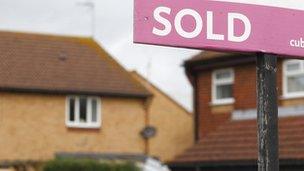Budget 2013: What does it mean for you?
- Published

Chancellor George Osborne said his Budget would be "for people who work hard and aspire to get on".
He predicted that this year, the economy would avoid slipping back into recession.
And he said that more people would be in work then ever before, and that the number of people claiming unemployment benefit would fall.
A variety of forthcoming tax and benefit changes were announced in last year's Autumn Statement.
But the chancellor added some big, new, eye-catching measures in this year's Budget.
Income tax
The personal allowance will rise again to £10,000, from the 2014-15 tax year. This is the first slice of income that all but the highest-paid can earn before income tax kicks in.
That higher level of personal allowance had always been this government's aspiration, but it has now been brought forward and given a definite date.
This means that even more lower-paid workers will not see their income taxed.
As previously announced, this allowance will rise anyway on 5 April this year - for those aged under 65 - from £8,105 to £9,440.
In 2013-14, the 20% basic rate of income tax will apply to the next £32,010 of income. After that the 40% higher tax rate applies.
But in 2014-15, the basic rate will apply to a narrower band of income - £31,865 - which means that the higher rate will kick in at £41,865 of income.
Help for would-be home buyers
- Cut in beer duty, by a penny a pint
- Interest-free loans to people buying new-build homes
- Cap on public sector pay extended to 2015/16
- Fuel duty rise, planned for September, scrapped
With hundreds of thousands of people locked out of home ownership by lenders' requirements for very high deposits, the government has launched a two-pronged plan to help matters.
Firstly, the current NewBuy scheme is being expanded and will be called Help to Buy.
The government's scheme will offer £3.5bn over three years, to home-buyers who can put down only a 5% deposit.
This "shared equity" money will provide a further 20% down payment for their house purchase. The loan will be interest free for five years and will be repaid when the property is sold.
It is still going to be targeted at newly built homes, but will be open to anyone, not just first-time buyers.
It will only apply to homes worth below £600,000.
What is the second prong?
A new mortgage guarantee scheme will be launched by the government in 2014.

Open for three years, it will offer mortgage guarantees to lenders, so that they can feel secure in offering mortgages to people with only small deposits to put down.
The lenders will be able to buy this insurance from the government, but will be able to claim for part of their losses - if any - when a borrower defaults.
Specifically, if a borrower puts down a 5% deposit, the scheme will insure most of the value of the loan that lies between 80% and 95% of the home's value.
The chancellor said this would underpin £130bn of mortgage lending.
It will also apply to homes worth up to £600,000.
Subsidy for child care
The Budget confirmed the government's announcement on Tuesday of a new system of taxpayer subsidy for childcare.
Tax-free childcare vouchers, worth £1,200 per child, will be on offer, along with increased support for families with children on universal credit.
From the autumn of 2015, working parents will be able to claim vouchers to subsidise the cost of childcare for every child under five.
Parents earning up to £150,000 will be able to claim back up to £1,200 of childcare costs a year.
Tax cut for employers
The complicated system of National Insurance will be made less onerous for employers.
A new Employment Allowance will knock the first £2,000 off the NI bill for every business and charity.
For big employers, this will be utterly trivial.
For the many small employers who employ just a few staff, this will be a big deal.
George Osborne said it would mean that 450,000 small businesses will in fact pay no NI at all.
And for commuters?
Employers will be able to offer their staff up to £10,000 per person in tax-free annual season ticket loans.
This is a doubling of the current tax-free allowance.
And drivers?

The Chancellor cancelled a fuel duty increase planned for the autumn of 2013.
This would have added about 3p to the cost of a litre of petrol or diesel.
If the rise had gone ahead, it would have cost motorists about £1bn in extra fuel duty and VAT.
For drinkers?
Cheaper beer seems to be the chancellor's great play for public popularity this year.
A planned 3p rise in beer duty tax has been cancelled. In fact, it is being replaced by a 1p cut in the duty on a pint of beer.
But although the so-called beer duty escalator has been scrapped, planned rises for all other alcohol duties stay in place.
Remind me of what else has already been announced?
Income tax
At the moment pensioners earning less than about £24,000 a year get a more generous tax-free allowance - £10,500 for 65-74 year olds and £10,660 for those aged 75 and over. That advantage gradually tapers off as income rises to about £29,000.
From April 6, those allowances for anyone already aged 65 will be frozen and the extra personal allowance will be scrapped for anyone who turns 65 after 5 April. This controversial move in last year's Budget was dubbed the "granny tax".
Also from April 6, the highest earners - those with income of more than £150,000 - will face a 45%, rather than 50% tax rate.
Benefits and pensions
The benefits landscape will change significantly as a result of measures already highlighted by the government.
For example, a range of working-age benefits will rise by just 1% in April. That is lower than the rate of inflation and, consequently, a real-terms cut.
This affects benefits such as jobseeker's allowance - which will rise by 71p to £71 a week - employment and support allowance and income support. Maternity, paternity and adoption pay will also rise by 1% in April.
Other benefits, such as carer's allowance and some disability benefits will mirror inflation, with a 2.2% rise.
Meanwhile, a guarantee for the basic state pension means it will rise by 2.5% in April, taking it to £110.15 a week.
New rules, starting in April will affect housing benefit, which is paid to less well-off council and housing association tenants to help with rent. Typically, claimants receive between £50 and £100 a week.
Families deemed to have too much living space by their local authorities will receive a reduced payment. Under the government's so-called "size criteria", families will be assessed for the number of bedrooms they actually need. The changes have been criticised as a "bedroom tax".
Changes to child benefit have already taken effect.
From January, families with one parent with a taxable income of more than £50,000 have lost some of the benefit, and it has been withdrawn entirely if one parent earns above £60,000.
Child benefit is paid at the rate of £20.30 a week for the first child, then £13.40 a week for each child after that. This rate is frozen until April 2014.
Tax credits, external - including child tax credit and working tax credit - will be uprated by 1% for three years from April 2013, apart from the basic and 30-hour elements where the uprating will not apply until 2014.
Other tax issues
Changes to tax residence rules, external come into effect in April.
These rules will affect the tax liability of many people who go to work overseas for a time, or those who come to the UK for the first time.
The Annual Residential Property Tax will begin in April. It will be paid by companies that own high-value residential properties. For example, an annual tax of £15,000 will be levied on properties valued at between £2m and £5m.
The company car fuel benefit charge threshold is changing slightly.
Savings
Savers have found it tough to get a decent return on their savings, given the economic climate and the situation that banks find themselves in.
From 6 April, the overall annual limit for Individual Savings Accounts (Isas) will rise from the current level of £11,280 to £11,520, a rise of 2.1%.
Half of this can be saved in a cash Isa, with the rest or the total amount able to go into a stocks and shares Isa.
Longer-term changes
The higher rate income tax threshold will increase by 1% a year in 2014-15 and 2015-16. That is below the level of inflation, and is likely to bring another 400,000 taxpayers into the 40% higher rate.
The annual exemption from tax of any capital gains will increase by 1% a year in 2014-15 and 2015-16, to £11,000 from 6 April, 2014 and £11,100 from 6 April, 2015.
Inheritance tax starts to be paid from an inheritance of £325,000 now. This was supposed to rise to £329,000 from April 2015 - the first increase since 2009 - but the chancellor changed his mind. It will now be frozen at its current rate until 2019 at the earliest.
For businesses
A new, optional, cash accounting regime for self-employed individuals and some partnerships with cash receipts of less than £77,000 will be available from 6 April.
This is intended to simplify the tax-reporting regime for small businesses.
Businesses will be restricted in setting certain income tax losses off against general income. From April, this will only be restricted to the greater of £50,000 or 25% of total income.
From April, workers may able be able to trade in some employment rights for shares in a business. These shares will be exempt from capital gains tax.